Ten years after the plane crash which killed Buddy Holly, the Big Bopper and Richie Valens, the Rolling Stones performed at the Altamont Speedway. You can’t help but look at those intervening years with astonishment at how times had changed. From sock hops to Manson, Hell’s Angels and the Stones…. Don McLean captured this loss of innocence perfectly in “American Pie”.
The song has been endlessly analyzed; it’s intentionally ambiguous and the meanings are still up for debate. But let’s take a stab at it line by line…
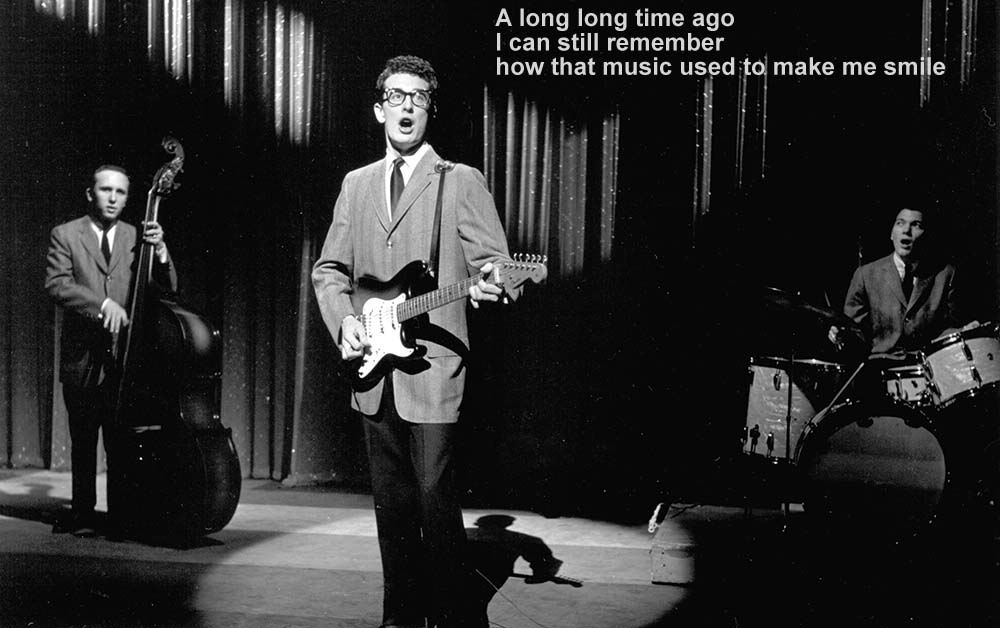
A long long time ago
I can still remember how that music used to make me smile
And I knew if I had my chance
That I could make those people dance
And maybe they’d be happy for a while
Don McLean reflects back on the days of innocence. In an interview with BBC Radio 2 (November 4th, 1993) he commented:
“I still remember this light going off in my head as I was sitting up in my little room writing my songs and thinking about Buddy Holly and just how sad that was and how much I loved that guy, and how much I loved his music and how much I felt for him… I started to write this ‘A long, long time ago’ about how it felt when I was a paperboy and I opened up these papers… and this whole fantasy came out and the song was written”
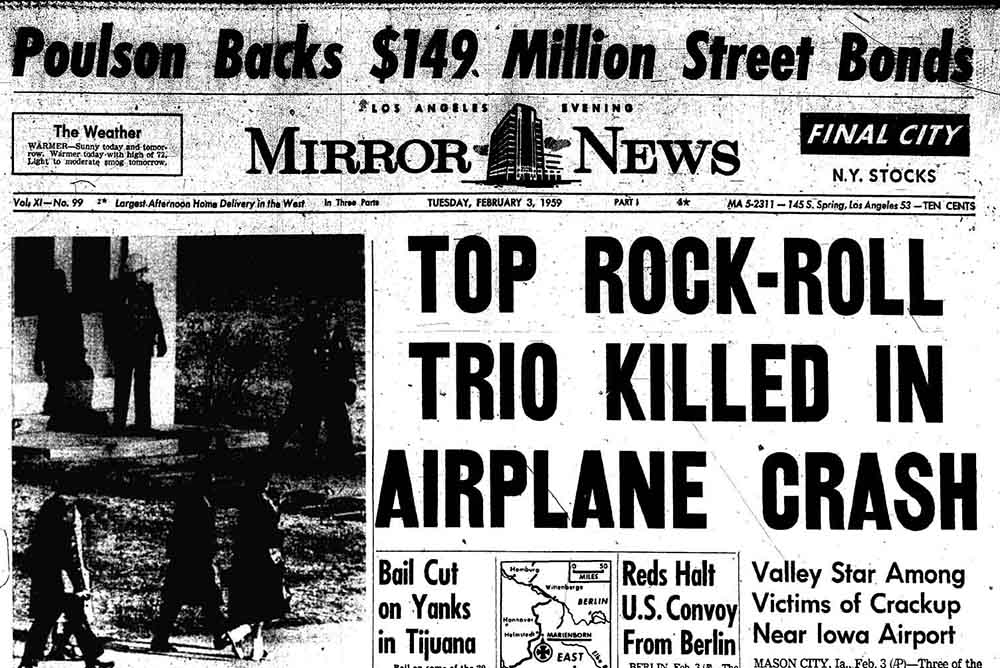
But February made me shiver
With every paper I’d deliver
Bad news on the doorstep
I couldn’t take one more step
I can’t remember if I cried
When I read about his widowed bride
But something touched me deep inside
The day the music died
On February 3, 1959, a plane crash took the lives of Buddy Holly, The Big Bopper and Richie Valenz. McLean’s sentimental disillusionment aside, it was an objectively bad day for rock/pop music; now that these three were gone, who was left? Elvis had been drafted, Chuck Berry was in hot water over a prostitute, and Little Richard had changed his tune, getting away from rock music.
McLean conveys the feeling he had as a paperboy and seeing the news on the headlines. It is thanks to McLean that this sad day is known as “the day the music died”.
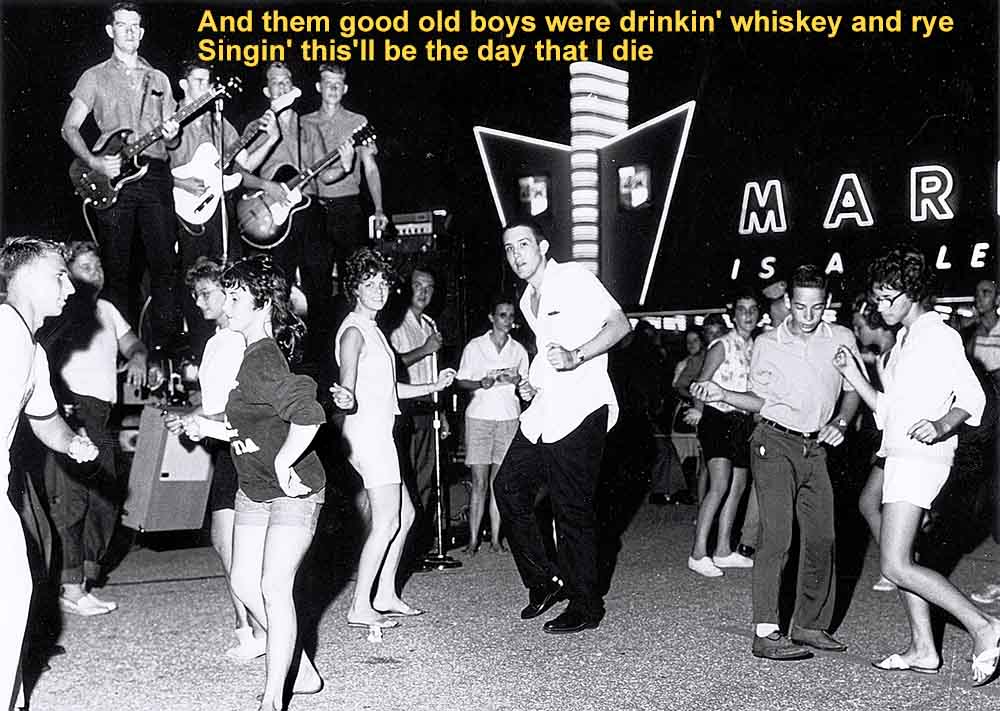
So, bye-bye, Miss American Pie
Drove my Chevy to the levee
But the levee was dry
And them good old boys were drinkin’ whiskey and rye
Singin’ this’ll be the day that I die
This’ll be the day that I die
McLean conveys sadness at the loss of American innocence (a farewell to the all-american apple pie) with imagery of the a 1950s farewell party. The lyrics have a double meaning. Don McLean grew up in New York, and he would listen to music and party at “The Levee” in New Rochelle, NY. Sometimes, when The Levee would close (i.e. when the levee was dry), McLean and his friends would drive across the river and scout for places to drink and have fun in Rye, NY.
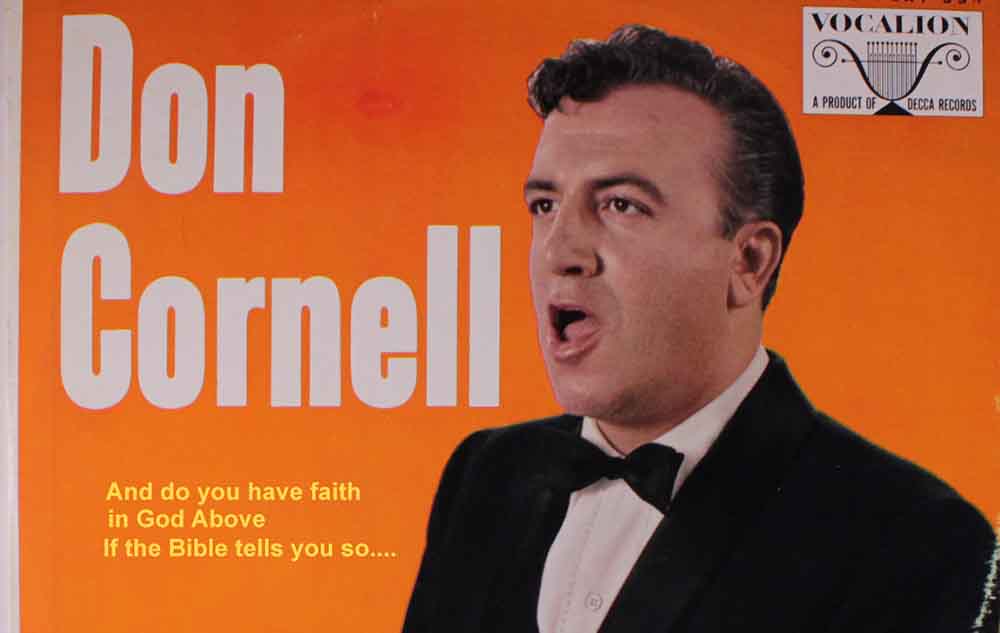
Did you write the Book of Love
And do you have faith in God above
If the Bible tells you so
Do you believe in rock n’ roll
Can music save your mortal soul
And can you teach me how to dance real slow
Well, I know that you’re in love with him
‘Cause I saw you dancin’ in the gym
You both kicked off your shoes
Man, I dig those rhythm & blues
I was a lonely, teenage broncin’ buck
With a pink carnation and a pickup truck
But I knew I was out of luck
The day the music died
I started singin’ {Refrain}
McLean continues to evoke the good ol’ days with references to “The Book of Love” by the Monotones, and even a Don Cornell hit, “The Bible Tells Me So”. There’s mention of sock hops and perhaps a reference to the Marty Robbins song “A White Sport Coat (with a Pink Carnation)”. The bottom line: we were young, we were pure… then the music died, and so did our innocence.
The next verse begins McLean’s great decent into veiled meanings, and much debated lyrics…
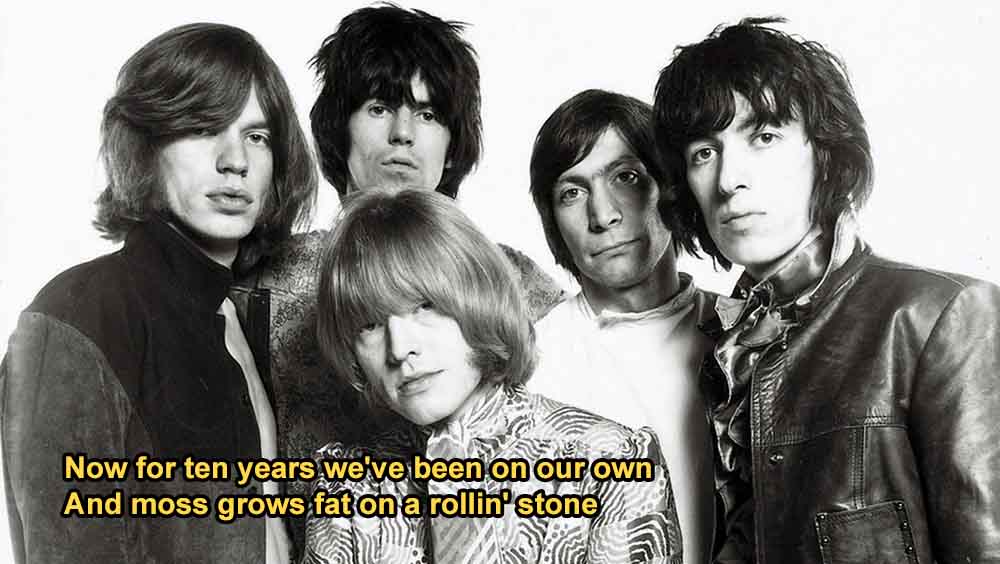
Now for ten years we’ve been on our own
And moss grows fat on a rollin’ stone
But that’s not how it used to be
Yes, Buddy Holly sang “Well you know, a rolling stone, don’t gather no moss” in his hit “Early in the Morning”; but this is also clearly a reference to The Rolling Stones. Indeed, the bookends of the song are Holly and The Stones. The “ten years” McLean describes are the day the music died (Feb. 1959) and Altamont (Dec. 1969).
There’s also an additional interpretation. Dylan, who sang “Like a Rolling Stone” – a major break from folk music in 1965 was involved in a motorcycle accident and subsequently laid low for about a year (“moss grows fat”), and many said he’d lost his muse.
When the Jester sang for the King and Queen
In a coat he borrowed from James Dean
In a voice that came from you and me
Oh, and while the King was looking down
The Jester stole his thorny crown
There’s no debate that Bob Dylan is The Jester in this song. Dylan, in a 2017 interview, expressed his dislike for the label: “A jester? Sure, the jester writes songs like ‘Masters of War,’ ‘A Hard Rain’s a-Gonna Fall,’ ‘It’s Alright, Ma’ – some jester. I have to think he’s talking about somebody else. Ask him.”
The king and queen reference in the first line are Peter Seeger and Joan Baez, folk music’s royalty before Dylan took center stage. Everyone is familiar with James Dean’s red jacket from Rebel Without a Cause. Dylan is seen wearing a similar coat on the cover the Freewheelin’ album from 1963.
Dylan steals the “thorny crown” from Elvis. The counter-culture has arrived.
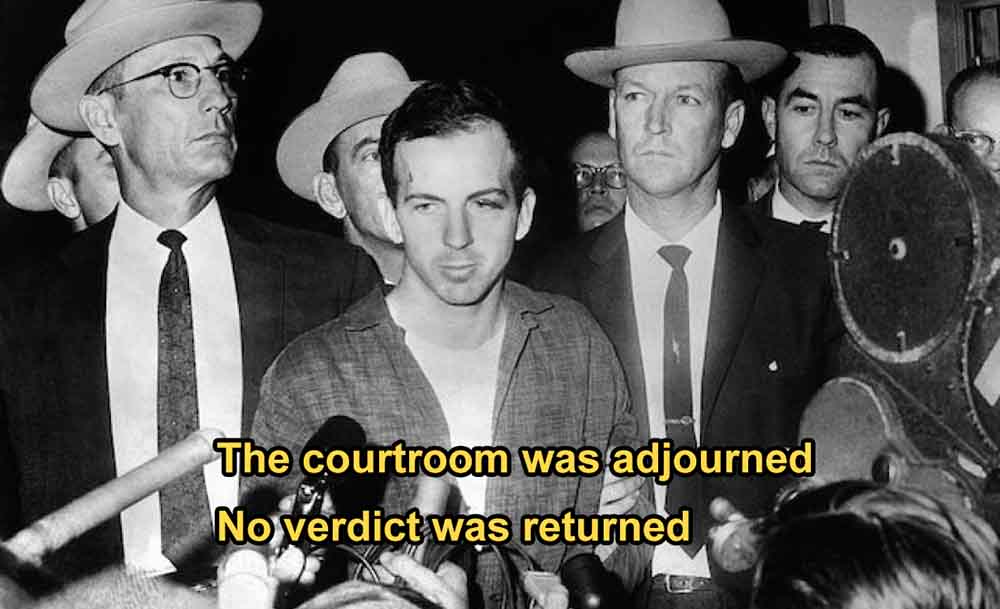
The courtroom was adjourned
No verdict was returned
If you’re going to write a song about the loss of innocence in American, you damn well better mention the Kennedy assassination.
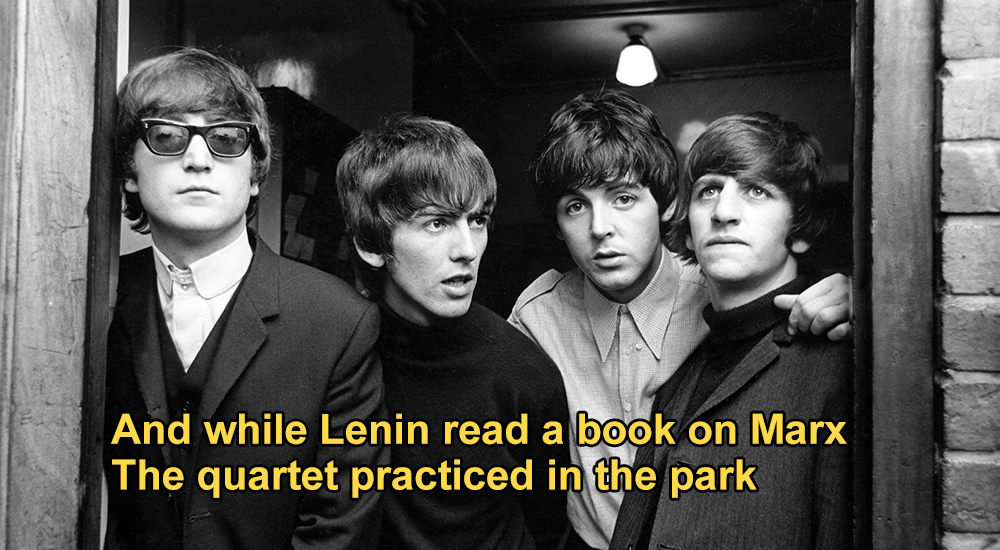
And while Lenin read a book on Marx
The quartet practiced in the park
And we sang dirges in the dark
The day the music died
We were singin’ {Refrain}
The Beatles arrive on the scene Clearly, Lenin is a play on Lennon, but the correlation to Marx is under debate. Marx, associated with the Communist Revolution, can be linked to Lennon via the song “Revolution” which mentions Chairman Mao. The dirges (funeral songs) possibly reference the tragic deaths of JFK, RFK and MLK.
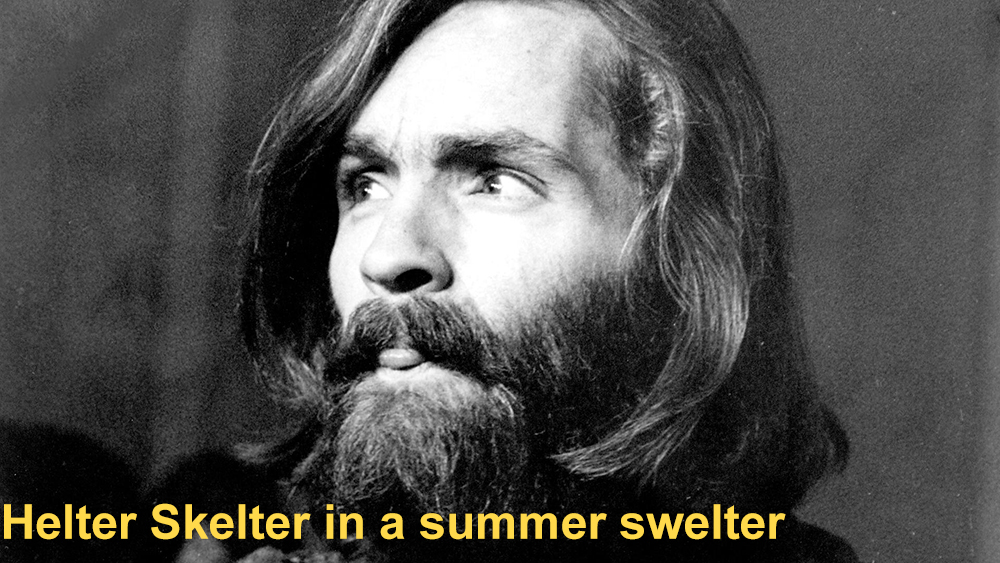
Helter Skelter in a summer swelter
The birds flew off with a fallout shelter
Eight miles high and falling fast
It landed foul on the grass
The players tried for a forward pass
With the Jester on the sidelines in a cast
McLean references the Manson murders (and continues The Beatles theme with “Helter Skelter”) as well as The Byrds and their song “Eight Miles High” and marijuana (“grass”). McLean again refers to Dylan who is on the sidelines – referencing his above mentioned motorcycle accident.
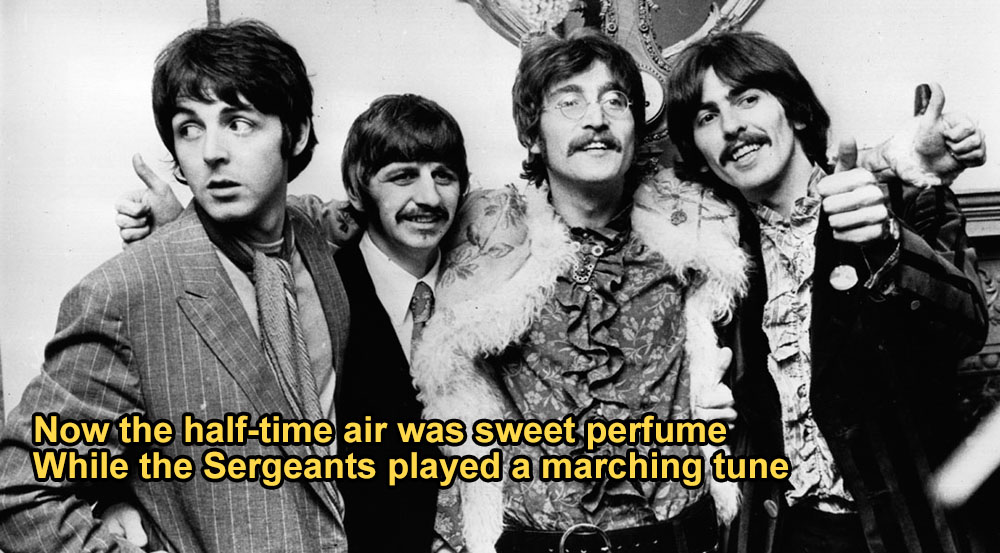
Now the half-time air was sweet perfume
While the Sergeants played a marching tune
We all got up to dance
Oh but we never got the chance
‘Cause the players tried to take the field
The marching band refused to yield
Do you recall what was revealed
The day the music died
We started singing {Refrain}
Some have speculated this alludes to the 1968 Democratic National Convention, but the consensus is that this is all about the death of traditional rock and roll via The Beatles. Sgt. Pepper brought about the end of rock as we knew it – the sounds of Buddy Holly and Elvis were over, replaced by a new sound that was not exactly made for dancing.
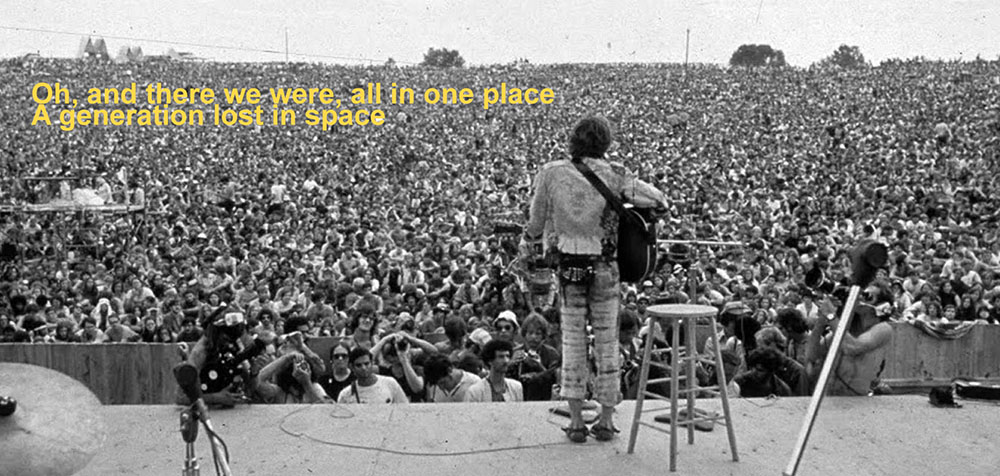
Oh, and there we were, all in one place
A generation lost in space
With no time left to start again
And here they are, a generation who grew up on “Lost in Space”, now the so-called “Lost Generation” stoned out of their minds, all together at Woodstock. It’s too late to start over, and where do we go from here?
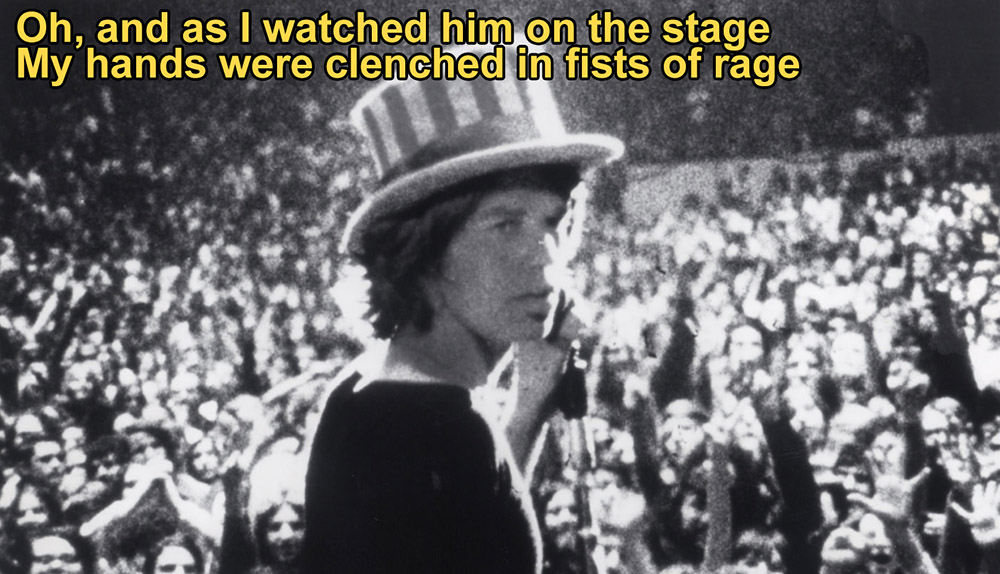
So come on, Jack, be nimble, Jack be quick
Jack Flash sat on a candlestick
‘Cause fire is the devils only friend
Oh, and as I watched him on the stage
My hands were clenched in fists of rage
No angel born in Hell
Could break that Satan’s spell
And as flames climbed high into the night
To light the sacrificial rite
I saw Satan laughing with delight
The day the music died
He was singing {Refrain}
And this is where it all goes to hell (literally). Mick Jagger (“Jumpin’ Jack Flash”) is the devil compared to those carefree days of Buddy Holly and sock hops. Those innocent days are over. The Stones had released Their Satanic Majesties Request and “Sympathy for the Devil”; the comparison to Satan is easy.
And now it’s ten years after the day the music died, and Jagger is performing at Altamont where a black man was stabbed and beaten to death by Hell’s Angels. “American Pie” looks at how ugly things have become, and then reflects back ten years ago, when the dark descent began.
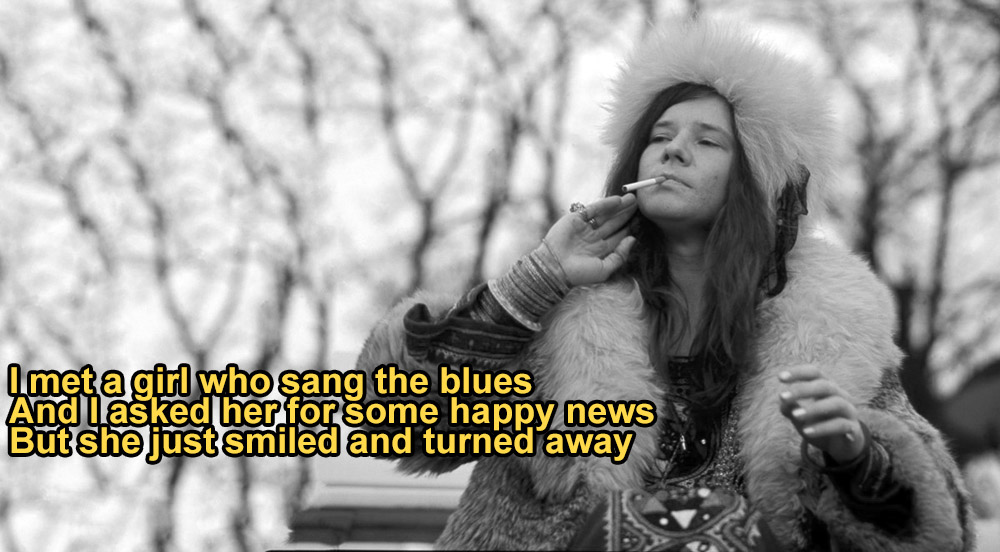
I met a girl who sang the blues
And I asked her for some happy news
But she just smiled and turned away
I went down to the sacred store
Where I’d heard the music years before
But the man there said the music wouldn’t play
McLean turns to Janis Joplin for hope, but she dies of a heroin overdose on October 4th, 1970. The rhythm and blues are gone, not even sold in the record stores. It seems everyone had forgotten about the great music released in the 1950s.
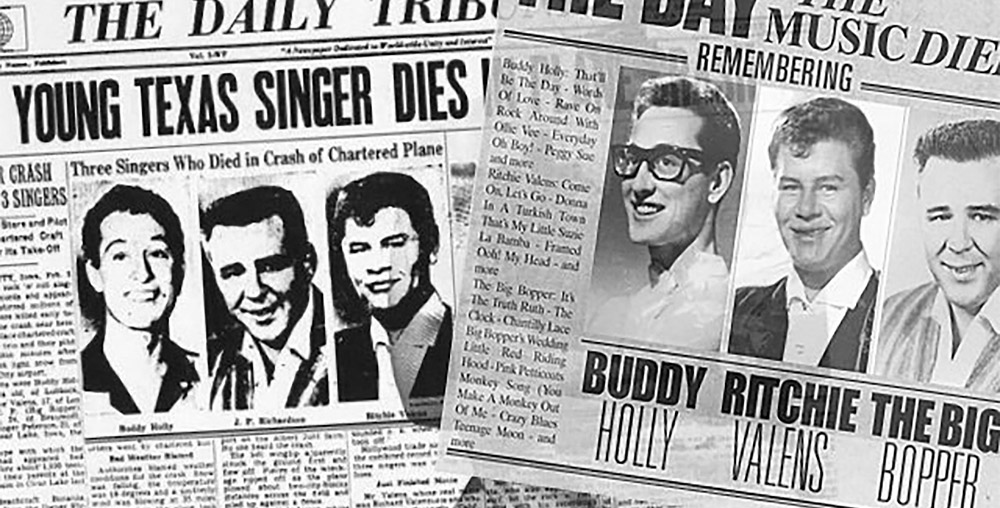
And in the streets the children screamed
The lovers cried, and the poets dreamed
But not a word was spoken
The church bells all were broken
And the three men I admire most
The Father, Son and the Holy Ghost
They caught the last train for the coast
The day the music died
And they were singin'{Refrain}
McLean artfully shifts from the turmoil and pain of the day (children screaming – rioters, protesters) back to the plane crash. The Father, Son and Holy Ghost likely also refers to JFK, RFK, and MLK, but McLean is clearly circling back to the day the music died.
“Killing Me Softly With His Song” was composed after Lori Lieberman saw McLean perform the song- which testifies to its power, and “American Pie” is every bit as enigmatic and stirring as it was back in 1971. While every word hasn’t been fully deciphered, the overall message of a generation’s disillusionment is crystal clear. Cover versions by Madonna and The Brady Bunch not withstanding, “American Pie” remains one of the most culturally significant songs of the twentieth century.
Would you like to support Flashbak?
Please consider making a donation to our site. We don't want to rely on ads to bring you the best of visual culture. You can also support us by signing up to our Mailing List. And you can also follow us on Facebook, Instagram and Twitter. For great art and culture delivered to your door, visit our shop.



